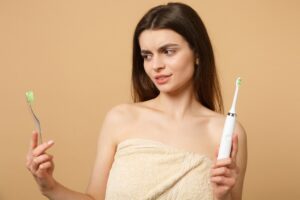
What’s The Best Toothbrush For My Teeth?
Retaining your old toothbrush for too long will not only reduce its capability to clean your teeth, but can also increase your risk of infection or illness.
Oral Health
15 September 2022
We all know brushing our teeth on a regular basis is necessary for good oral health, but what we brush them with is just as important. Choosing the right toothbrush is something that many of us simply don’t put enough thought into. You use your toothbrush multiple times a day, so it needs to be high quality, durable and do its job!
A Brief History Of The Toothbrush
It’s generally believed that the first ever toothbrushes were invented by ancient Egyptians around 3200 BC. Made out of frayed twigs, these primitive cleaning aids were used to remove large pieces of food from an individual’s teeth or gums. Around the 1400’s, the Chinese created an item that used pig hair and bamboo. This more closely resembled the type of the brush we’re familiar with today — but was still far from it. It wasn’t until 1780 that Englishman, William Addis, brought the first official “toothbrush” to the market. Still made with boar bristles, however, it proved to be an insufficient material that was prone to retaining bacteria and falling apart. It took all the way until the 1930’s for American company, DuPont, to introduce the synthetic fibred version we use today.
Hard, Soft And Medium Bristles
While toothbrushes are available in harder and medium bristled heads, they’re not recommended for use. Many of us do prefer a harder head, but they’re simply not good for our teeth or gums. The brushing of your teeth should be a gentle motion that acts only to remove the thin layer of dirt on the outside. Applying too much pressure or using a brush that’s too hard can cause a recession of the gum line and wear away at the outer enamel coating of your teeth. This leads to greater exposure of the dentin layer underneath, causing conditions like increased sensitivity and a higher risk of damage to the tooth in general.
Are Electric Toothbrushes Better Than Manual?
Electric toothbrushes will provide you with a range of benefits simply not able to be achieved with their manual counterparts. For one, the speed at which they move allows for a more comprehensive cleaning motion that lifts significantly more dirt hidden in the grooves of the tooth. The smaller, compact head also allows you to access tighter areas of your mouth that you wouldn’t be able to reach with a larger brush.
Electric toothbrushes can also be a great option for individuals with limited dexterity. Sufferers of conditions like arthritis will know all too well that it can often be difficult to manoeuvre your hands and fingers. An electric toothbrush creates a more passive experience, where the motions and vibrations of the motorised head do most of the work for you.
Regularly Replacing Your Brush or Heads
Whether it’s electric toothbrush heads or manual, disposable brushes, regular replacement is a necessity. It’s recommended that you change your brush every two to three months, or whenever you notice signs of significant wear. This can include a flattening of the bristles or a splayed out appearance where the bristles have started to spread apart.
Retaining your old toothbrush for too long will not only reduce its capability to clean your teeth, but can also increase your risk of infection or illness. The longer you have your brush, the more chance bacteria or fungal organisms have to grow within its bristled crevices. If you notice any discolouration or unpleasant odours coming from your brush or electric toothbrush head, it’s best to replace it immediately.
What Toothbrush Is Good For Braces?
If you’ve got metal braces then you’ve probably tried out a few different brushes. It can often be uncomfortable when the bristles get tangled up or caught in your braces’ wires. The best option is usually a brush with an indented intersection. Commonly referred to as a V-Shaped brush, the vertical line of space down the centre of the toothbrush’s head gives you the room you require. You’re able to avoid too much contact with the braces themselves while still providing a comprehensive clean. Most electric toothbrush heads are also suitable, as their specially contoured shape allows for easy manoeuvrability around the braces.
Dental Care At Innovative Dental
If you’re experiencing any of the issues above, or have any other concerns for your oral health, visit Innovative Dental today. We provide a range of affordable, high quality dental services that range from emergency treatment to cosmetic procedures.
Contact Innovative Dental for more information about how we can help you.





